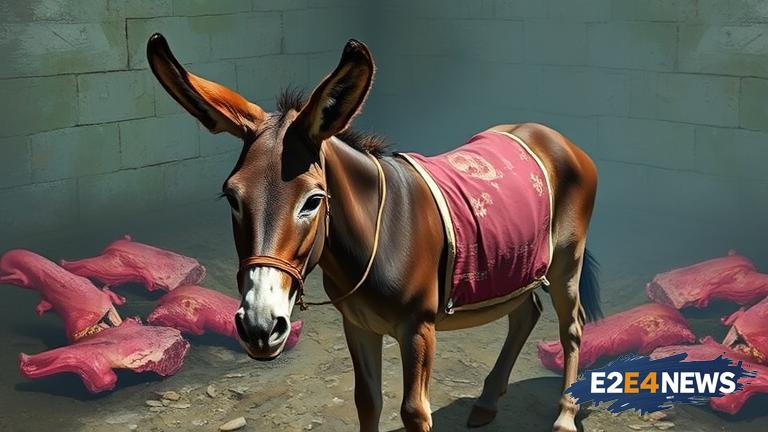In a shocking turn of events, a donkey meat supply chain has been busted in Islamabad, revealing a complex network of individuals involved in the illicit trade. The raid, conducted by local authorities, has sent shockwaves throughout the community, with many consumers expressing outrage and disgust at the discovery. According to reports, the donkey meat was being sold as beef, deceiving unsuspecting customers and putting their health at risk. The supply chain, which spanned several cities, was found to be well-organized and sophisticated, with multiple players involved in the trade. The donkeys, sourced from various parts of the country, were being slaughtered and processed in secret facilities, before being transported to markets and restaurants. The meat was then sold to consumers, who were unaware of its true origin. The raid has raised serious concerns about food safety and authenticity, with many questioning how such a large-scale operation was able to go undetected for so long. The authorities have arrested several individuals in connection with the supply chain, and are currently investigating the matter further. The incident has also sparked a wider debate about the need for stricter regulations and enforcement in the food industry. Many are calling for greater transparency and accountability, to prevent such incidents from occurring in the future. The donkey meat supply chain is not only a health risk, but also a serious animal welfare concern. Donkeys are often subjected to inhumane treatment and slaughter, highlighting the need for better protection and regulation of animal welfare. The incident has also raised questions about the role of corruption and negligence in the food industry, with many suspecting that officials may have turned a blind eye to the illicit trade. The government has promised to take action against those involved, and to implement stricter measures to prevent such incidents from occurring in the future. However, many are skeptical about the effectiveness of these measures, and are calling for more radical reforms. The donkey meat supply chain is a wake-up call for the food industry, highlighting the need for greater transparency, accountability, and regulation. It is a reminder that the food we eat is not always what it seems, and that consumers must be vigilant and demand better from those who produce and sell their food. The incident has also sparked a wider conversation about the cultural and social implications of food production and consumption. In many parts of the world, donkeys are considered sacred animals, and their slaughter and consumption is taboo. The donkey meat supply chain has therefore not only raised health and animal welfare concerns, but also cultural and social questions about the values and norms that govern our food systems. As the investigation into the donkey meat supply chain continues, many are left wondering how such a shocking truth was able to remain hidden for so long. The incident is a reminder that the food industry is complex and multifaceted, and that consumers must be aware of the risks and challenges involved in producing and consuming food. It is also a call to action, highlighting the need for greater transparency, accountability, and regulation in the food industry. The donkey meat supply chain is a shocking reminder of the dangers of a lack of regulation and oversight in the food industry, and the need for consumers to be vigilant and demand better from those who produce and sell their food.
